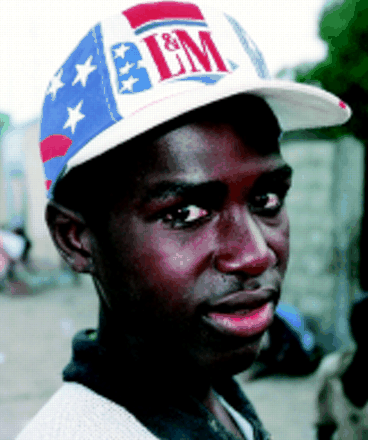Article Text
Statistics from Altmetric.com
It is laudable that the State Department issued a directive on American international policy on tobacco in February 1998. At the same time it represents no real change in policy.
Old fair trade rhetoric and a new pro-health agenda aren’t easily squared, as the directive clearly indicates. Wrought with the old misguided logic of the “legal” product, its policy objective of ensuring American companies “equal access to a shrinking global market for tobacco” echoes the old USTR (United States trade representative) mentality: “We know cigarettes are bad, but hey, we’ve got to help ‘poor’ American companies get their ‘fair’ share of the pie!” This ignores the fact that these companies’ marketing techniques are often more aggressive. The result? American companies end up, not only hogging the pie, but also increasing its size.
L&M hats, Lucky Strike shorts, Marlboro baby clothes: ways in which American companies increase the size of the market pie in Senegal.
Furthermore the policy suffers from a lack of “teeth”. Although the first guideline of the directive explicitly states: “Posts [embassy officials] are encouraged to assist and promote tobacco-control efforts in host countries,” there is no mention of how exactly posts might do so. American embassies are not in the business of providing financial assistance to local non-governmental organisations. That’s the job of the United States Agency for International Development (USAID), but USAID’s five-year plan focuses on family planning, child and maternal health, and AIDS prevention—and not tobacco control.
There is little evidence so far that local anti-tobacco movements have benefited from the measure—except in Senegal. Perhaps the Senegalese example can give tobacco control groups elsewhere ideas on how best to approach their local American embassy and make the directive work for them.
The key for tobacco control groups is to think of ways American embassies can lend support without using American funds or compromising their integrity as a front for official United States policy. Perhaps the folks in Senegal have a good deal: Ambassador Dane F Smith is a member of Action on Smoking and Health (USA) and confesses to “biting his tongue” when forced to deal with American tobacco companies. In a brief meeting with the ambassador, he acknowledged having read aNew York Times article on American corporations selling cigarettes in Senegal through liberal use of American imagery. Familiar with the State Department’s directive, he was openly receptive to the idea of lending support to Senegal’s anti-tobacco movement.
Although the ambassador could not endorse any specific organisation, he agreed to issue a public statement on the occasion of World No-Tobacco Day: “Growing up Tobacco Free” (31 May 1998). This statement ran in at least one local paper and served as important foreign political support for the local anti-tobacco activists’ cause.
After World No-Tobacco Day, the new anti-tobacco federation wrote a letter of introduction to Ambassador Smith, also thanking him for issuing the public statement, and inquiring as to whether the embassy had any old computers available for donation. The response was favourable and two months later a shiny new-looking computer found a new home at the federation. This generous donation will allow the federation to establish itself much more rapidly, by making everything from letter writing to electronic communication much more efficient.




